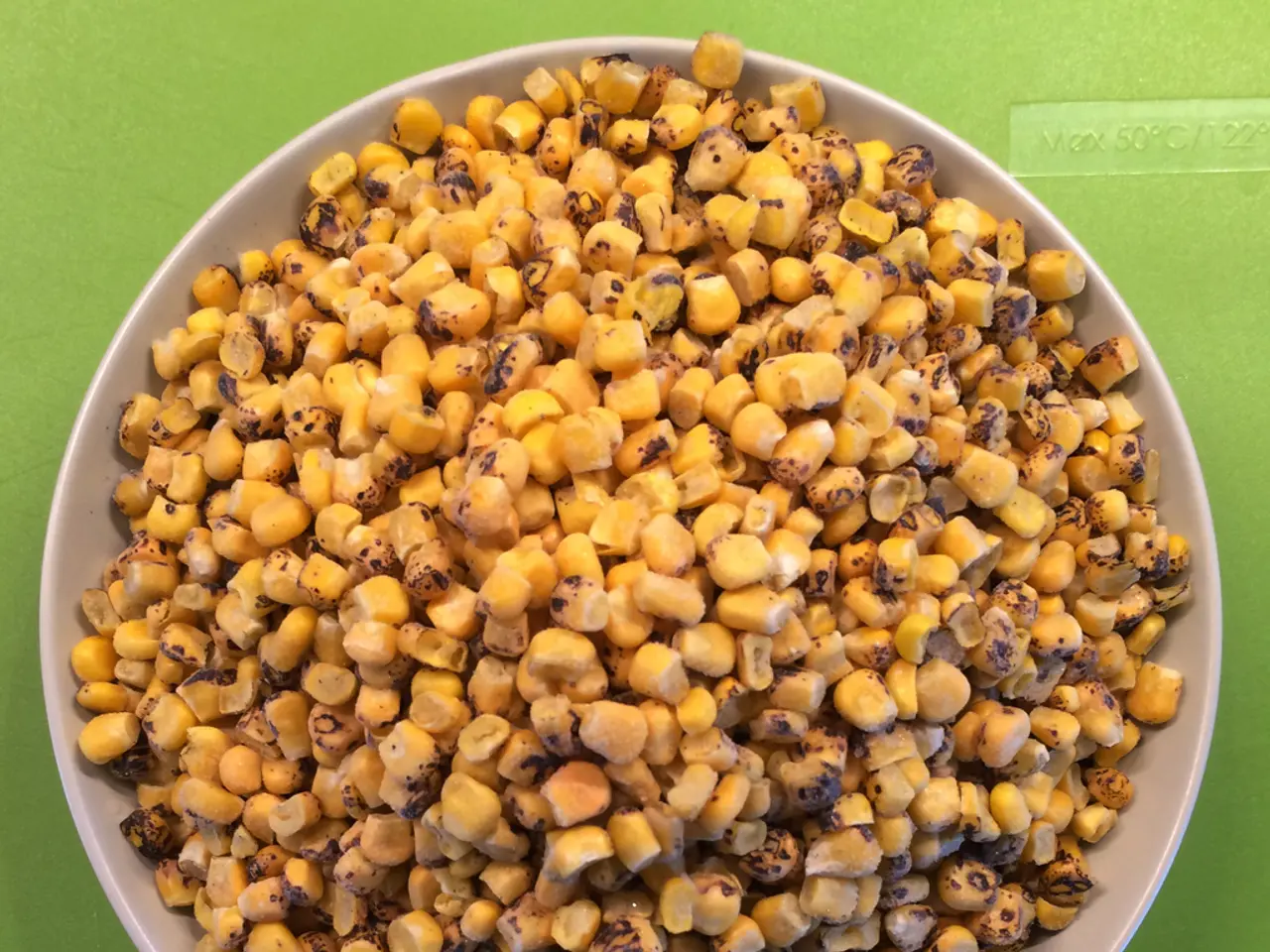Insights on Pea Protein: Comprehensive Guide
Pea Protein: A Vegan-Friendly Protein Supplement
Pea protein, derived from yellow split peas, is a popular choice among vegetarians, vegans, and those with dietary restrictions. This plant-based protein is hypoallergenic, being gluten-free and lactose-free, making it an ideal alternative for those with allergies or intolerances.
Pea protein is a valuable addition to any diet, as protein is one of the building blocks of food. One cup of yellow peas contains about 8 grams of protein, and pea protein powder can provide a significant amount of protein as a dietary supplement. The recommended dietary allowance of protein for an adult is about 0.8 grams per kilogram of body weight.
However, it's important to note that pea protein is less bioavailable than other proteins as it does not have essential amino acids in the same quantities as complete proteins like whey protein. To help your body absorb pea protein, it's crucial to ensure that your diet includes foods with necessary amino acids.
There are three types of pea protein products: isolate, concentrate, and textured. Pea protein isolate contains high amounts of protein and is suitable for weight loss and muscle building. On the other hand, pea protein concentrate contains additional carbs and proteins or carbs and fats and is suitable for adding weight or as a meal replacement. Textured pea protein is less processed and used primarily for making meat alternatives.
Pea protein shakes have a creamier texture compared to other protein options like whey protein. They also have a mild, earthy taste. Pea protein is easily digestible and is easy on the stomach, making it a preferred choice for those sensitive to dairy or gluten.
When comparing pea protein and whey protein, neither is inherently better. They have different nutritional profiles. Whey protein has more calcium and potassium, while pea protein has more iron. If you have a lactose allergy, pea protein is a preferred option as it does not contain lactose.
In conclusion, pea protein is a great plant-based protein supplement that is vegan-friendly, allergen-friendly, and easy on the digestive system. However, it may require combining with other proteins for optimal amino acid completeness. Whey protein, on the other hand, is a complete protein with high leucine and BCAAs for superior muscle growth and recovery, but it is not suitable for vegans or those with lactose intolerance/sensitivity.
| Aspect | Pea Protein | Whey Protein | |--------------------------|-----------------------------------------------------------|-------------------------------------------------------------| | Source | Plant-based (yellow split peas), vegan and allergen-free | Dairy-based (milk byproduct) | | Protein Completeness | Contains all essential amino acids but low in methionine and cysteine; not fully "complete" alone without combining with other proteins | Complete protein with all essential amino acids, high in leucine (key for muscle growth) | | Muscle Growth & Recovery | Supports muscle growth but may require larger servings or blending to match whey efficacy | Superior for building lean muscle and faster recovery due to high branched-chain amino acids (BCAAs), especially leucine | | Digestion & Absorption | Slower digestion, generally easier on digestion, less likely to cause bloating | Fast-absorbing, ideal post-workout; may cause bloating in lactose-sensitive individuals | | Taste & Texture | Mild, earthy taste with a thicker, sometimes chalky texture | Smooth, creamy, often preferred taste and texture | | Suitability | Suitable for vegans, people with lactose intolerance, gluten allergies, and common allergen sensitivities | Not suitable for vegans or lactose-intolerant individuals | | Price | Moderate to high, especially in blends for completeness | Moderate to premium pricing depending on protein type (concentrate, isolate, hydrolysate) | | Additional benefits | Naturally free of lactose, dairy, and gluten | Contains bioactive compounds (in concentrates) that may offer added health benefits; hydrolysates absorb even faster |
[1] Pea Protein: A Comprehensive Review [2] Whey Protein vs. Pea Protein: A Systematic Review [3] Pea Protein: A Review of Its Role as a Functional Ingredient in Food and Beverage Products [4] Pea Protein: A Review of Its Nutritional Profile and Health Benefits
- Incorporating pea protein into a health-and-wellness lifestyle can aid in ensuring a sufficient daily intake of protein, essential for food's construction and overall health.
- For a balanced, nutrient-rich diet, pair pea protein with food-and-drink sources that provide necessary amino acids for optimal absorption of this plant-based protein.
- Lifestyle enthusiasts and individuals looking for alternatives in the realm of healthy-cooking might consider experimenting with recipes that utilize pea protein powder for added protein.
- In the health-and-wellness industry, where conversations about food-and-drink revolve around promoting a healthy lifestyle and networking with like-minded peers, educated discussions surrounding pea protein's nutritional profile and benefits are quite relevant and topical.




